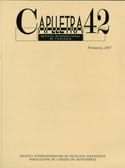Observacions sobre la posició dels subjectes postverbals en català i castellà
DOI:
https://doi.org/10.7203/caplletra.42.4825Keywords:
postverbal subject, cartography, manner adverbs, weak pronouns, quantifiers, restructuring Abstract
Abstract
This is a comparative study of the different positions of postverbal subjects in two closely related languages that nevertheless show clear differences in this respect.
The comparative study will allow us to reject the idea that postverbal subjects in Romance languages are in a unique in situ position Spec VP as has been proposed recently (Motapayane1995, Ordóñez 1998, Costa 2000, Alexiadou i Anagnostopoulou 2001, Cardinaletti 2001). On the contrary, this study will show clearly that there is a need for two positions for postverbal subjects in order to understand the parametric differences between Catalan and Spanish. The general hypothesis will be that the subjects can access a higher Spec of what I will call SubjP, but not Catalan. This will
account for the different distribution of subjects respects to adverbs, quantifiers, and restructuring contexts. This paper clearly shows that a finer and richer functional structure above VP and below the final landing site of subjects is needed to account for the differences between Catalan and Spanish. Therefore, this paper is another contribution to the cartographic studies initiated by Rizzi (1997).
 Downloads
Downloads
Downloads
Published
How to Cite
-
Abstract559
-
PDF (Català)271
Issue
Section
License
Authors submitting work to Caplletra for publication must be the legitimate holder of the usage rights. Legitimacy for the purposes of publishing the work must also include images, tables, diagrams and any other materials that may complement the text, whether they are the author of such material or not.
Copyright: on publishing their work in the journal, the author grants Caplletra. Revista Internacional de Filologia usage rights (reproduction, distribution and public communication) for both the paper printed version and for the electronic version.
All work published in Caplletra is covered by the Creative Commons license type Attribution-NonCommercial-NoDerivatives 4.0 (CC BY-NC-ND 4.0).
RESPONSABILITY
Caplletra. Revista Internacional de Filologia does not necessarily identify with the points of view expressed in the papers it publishes.
Caplletra. Revista Internacional de Filologia accepts no responsibility whatsoever for any eventual infringement of intellectual property rights on the part of authors.






